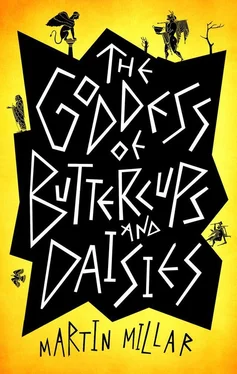He found Antimachus sitting in the shade of an olive tree, watching his friend Gelus teach wrestling moves to a group of eighteen-year-olds. The young wrestlers, also naked, looked even more athletic than the discus-throwers. Again Aristophanes felt out of condition. That wasn’t something Antimachus worried about; he was one of Athens’ larger citizens. He saw Aristophanes coming and didn’t bother to pretend to be pleased.
Aristophanes knew there was no point in making a tactful approach. ‘Antimachus, I’ve got no scenery, no props and I can’t afford to hire a decent choreographer. You have to give me more funds.’
Antimachus shrugged. Though he was sitting in the shade, he was sweating as profusely as the athletes. He dabbed his face with a fancy piece of cloth.
‘I can’t do that.’
‘My rivals both have bigger budgets! Eupolis and Leucon are recruiting all the best talent!’
‘Maybe they’re just better playwrights than you?’
Aristophanes glared at him, and once again cursed the day he’d been assigned as his producer. It was all meant to be done randomly, by drawing lots, but he had his suspicions.
‘Antimachus, ever since you were selected as my choregos, you’ve put obstacles in my way. I don’t understand why. Wealthy citizens are usually proud to produce a comedy. The post of choregos is meant to be an honour.’
‘Then I’m honoured,’ said Antimachus. ‘But you can’t have any more money. I can’t afford it.’
‘You were pleased enough to put on your best clothes and take part in the opening procession! You didn’t mind the applause then, did you?’
‘I was simply doing my duty after being selected,’ said Antimachus. ‘That doesn’t mean I can provide you with endless funds.’
‘Is this all because I once mildly criticised you in a play?’
Antimachus growled. The languid expression he’d been attempting to maintain vanished. ‘Mildly criticised? You ridiculed me in the vilest of terms. Your actors pointed at me from the stage and threatened to throw dung at me! I was a laughing stock. Too bad for you I ended up as your producer this year.’
There was a cry from one of the wrestlers as he was thrown heavily to the ground, followed by a sharp reprimand from Gelus the gymnastis, telling him to get up and stop complaining.
‘If my play looks cheap on stage it will reflect badly on you.’
‘Really?’ A cunning look spread over Antimachus’s florid features. ‘I think a lot of people might be pleased that I didn’t support your play. It’s called Peace , isn’t it?’
‘Yes. What of it?’
‘There are important citizens in Athens who won’t look kindly on a playwright asking the city to make peace.’
‘Important citizens? Like your friend Euphranor with his weapons factory?’
‘Him, and plenty of others. You should stay out of politics, Aristophanes. If you get too involved, you never know what harm you might come to.’
Aristophanes left the Lyceum seething with the injustice of it all. He scowled at the discus-throwers on his way out. Citizens generally appreciated the strength and beauty of the naked, oiled athletes, but by now he was finding them depressing. He managed a respectful nod towards the shrine of the Muses as he left, but other than that he walked home depressed, completely absorbed by thoughts of failure.
Bremusa and the Goddess Athena walked unseen down the slopes of Mount Olympus. It was some time since Bremusa had left Olympus on a mission. It felt good to be back in her leather armour. Athena had expressed some doubts about her wearing armour to Athens, fearing it would make her conspicuous, but on consideration she gave her consent.
‘You’re going to look conspicuous whatever you wear, but the city will be full of visitors for the Dionysia, so it shouldn’t matter that much. Try not to draw your sword, the Athenians won’t like any trouble at their festival.’
‘Will there be other warriors in the city?’
‘All the Athenians are warriors, in a way.’
‘You mean they’re shopkeepers who pick up a spear when they have to.’
‘Don’t disparage them. They’ve fought valiantly when it was necessary. If it wasn’t for Athens, Greece would be a Persian colony by now. But there won’t be anyone looking for a fight at the moment, I shouldn’t think. Everyone will be too busy enjoying the festival.’
‘What’s the Dionysia like?’
The goddess looked surprised. ‘Haven’t you ever been?’
Bremusa shook her head.
‘Bremusa, you’ve been with me on Mount Olympus for more than seven hundred years. How can it be that you’ve never taken a trip to the great Dionysia?’
‘I suppose I never had any reason.’
Athena smiled. ‘The Spring Festival in Athens is marvellous. Tragedies, comedies, music, song, dancing — you’ll like it.’
‘No I won’t.’
‘I’m sure you will.’
‘I really think I won’t.’
‘Didn’t Amazons ever have any fun?’
‘We liked killing people.’
They walked on downhill in silence, passing through the region where only the divines could go, and out into the world of mortal men. It was sunny and pleasant, more pleasant than Bremusa had expected.
‘I still don’t see why we need to recruit some river goddess,’ she said.
‘Metricia’s not a goddess, she’s just a river spirit. I told you Zeus will no longer allow gods or goddesses to enter Athens for the Dionysia. But Metricia will be a useful companion for you. She has a lot of power. She’ll locate Laet, and I expect her capacity for spiritual healing will dispel her bad energy.’
Bremusa nodded. She wasn’t that keen on travelling with a companion she’d never met, but she supposed it made sense. Once they reached Athens, they’d need to find Laet quickly, before she did too much damage.
The aura of the Divine Mount Olympus stretched out for some way beyond its confines. They passed a centaur as they entered the woods, and Bremusa thought she heard some giggling in the undergrowth, from nymphs perhaps.
‘The temple isn’t far,’ said the goddess.
They passed over a small hillock, entered another wooded grove, then halted in surprise. There in front of them was the temple and shrine of the river spirit Metricia, but it was in ruins. Slates had fallen from the roof and the walls were crumbling. Vines grew around the marble pillars. Athena frowned, quite deeply. She walked towards the entrance but Bremusa quickly stepped in front of her. She intended to go in first, in case there was anything dangerous inside.
The temple had only two rooms, and the wall between them was damaged. Bremusa thought it was unoccupied till she saw a young woman asleep on a couch. She had a blanket draped half on, half off, and her long, black, wavy hair was splayed over the cushion she used as a pillow. Beside the couch were several empty amphoras of wine. The sight of a young woman, apparently inebriated in a holy shrine, irritated her.
‘On your feet for the Goddess Athena!’ she cried.
The young woman opened her eyes. She looked at them, without rising.
‘What happened to this temple?’ asked the goddess.
‘The war,’ replied the young woman. She yawned, then smiled as she rose from the couch. ‘Have you come to repair it?’
‘The Goddess Athena does not go around repairing buildings like a common workman!’ cried Bremusa.
‘It’s cold in winter,’ mumbled the girl.
Athena looked around in displeasure. ‘Where is the great river spirit Metricia?’
‘She was depressed by all the fighting so she changed back into a river and moved away.’
Athena scowled. ‘I hate it when you need someone and then you find out they’ve changed into a river and gone away.’
Читать дальше












